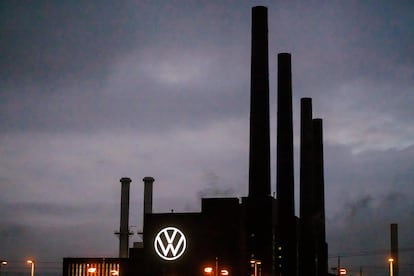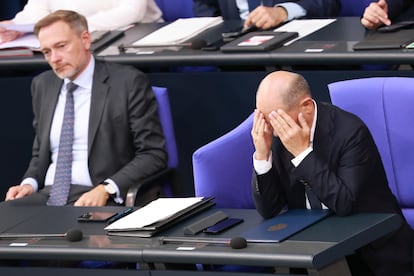Germany is ‘kaput’: Why the economic model no longer works in the proud country of automobiles
The Volkswagen crisis is just the tip of the iceberg of a larger problem. Europe’s old locomotive has stalled and must overhaul its industrial system, based on cheap Russian energy and exports to China


The announcement that Volkswagen plans to close three factories in Germany, lay off tens of thousands of workers and impose pay cuts of 10% for the entire workforce has come as a collective shock in a place that defines itself as “Autoland,” the country of cars. In Germany, the automobile industry is much more than an economic sector and the importance of Volkswagen transcends its profit and loss account or its number of employees. The motor giant has always been a symbol of German power. Now, converted into a mirror of the country’s industrial crisis, its difficulties hit where it hurts the most.
With annual GDP set to contract for a second year in a row, Volkswagen’s problems reflect the plight of the German economy. Trapped in an outdated model, it has become clear that Europe’s former economic engine was dependent on cheap Russian gas and exports to China. With the war in Ukraine, the bubble has burst. “The old business model no longer works,” stated Focus magazine recently.
The German crisis contains many facets, and none of them seem likely to be resolved in the short term: the migration of big industry, an increasingly gloomy demographic outlook, the inability to attract qualified labour, declining infrastructure and a notable lack of innovation. Volkswagen, unable to compete internationally, is the symptom of an engine that no longer runs. “Made in Germany” has lost its shine.
“Volkswagen is not only an icon of the entire German economy, but also a symbol of the decline of the whole industry,” says Carsten Brzeski, head of macroeconomics at ING. The company’s crisis “shows that a series of bad management decisions, coupled with a certain arrogance and underestimation of new technologies and competitors, as well as the changing role of China in the global economy, are taking a huge toll on the entire German industry,” he added in statements to EL PAÍS.
Another emblem in dire straits
In recent months, there has been a steady stream of bad news concerning the manufacturing sector. Volkswagen’s announcement was followed by that of Thyssenkrupp, another emblem of German industrial power, where thousands of jobs in its steel division are at risk. In September, Meyer Werft, a shipyard over 200 years old, avoided bankruptcy thanks to a public bailout worth €400 million ($423 million).
The industrial giant is reeling, exposing the weaknesses of its economic model. Industrial production has fallen by 20% below its peak in 2017, according to data from Deutsche Bank Research, in what its chief economist, Robin Winkler, described in a recent analysis as “the steepest decline in the history of the Federal Republic” — that is, since the end of the Second World War.
Siegfried Russwurm, the head of the powerful Federation of German Industries (BDI), has warned that the reforms that the German economy so desperately needs cannot wait. According to the predictions of a comprehensive report by the Boston Consulting Group and the German Economic Institute (IW), presented in September, one-fifth of German industrial production is in danger of disappearing by 2030. “Deindustrialization is a real risk,” the industry boss declared solemnly. The report, entitled Paths of transformation, states that Germany is falling far behind internationally. “Around one-fifth of industrial value creation in Germany is threatened, progressive deindustrialization is a real danger and will become a bitter reality if decisive measures are not taken to counteract it,” it concludes.
Industrial production in Germany began to fall earlier and faster than in other eurozone countries, says Sander Tordoir, chief economist at the Centre for European Reform (CER) think tank, who points out to EL PAÍS the shock that the war in Ukraine has had on the country’s economy: “The German model was based on energy from Russia and on export-driven growth thanks to demand from the United States and China. These pillars have been deeply shaken.”
The crisis in the automotive sector, which is common to all European manufacturers, is being experienced with particular anguish in Germany, where it is by far the largest industrial sector by turnover. According to data from the Federal Statistical Office, 17% of German exports in 2023 were motor vehicles and parts. The sector employs no fewer than 770,000 people. Volkswagen’s announcement that it is considering closing plants in the country for the first time in its 87-year history has shocked public opinion. Although the economy has been stagnating since 2020, pessimism had not yet set in because employment remained a solid pillar.
Resting on one’s laurels
The crisis in the sector is essentially due to German carmakers resting on their laurels, says Ferdinand Dudenhöffer, founder of the Centre for Automotive Research (CAR) and one of the leading experts in the sector. German brands have lagged behind in the development of electric vehicles, their batteries, and their software, and public policies have only made the problem worse, he said during a meeting with foreign correspondents in Berlin.
Profits are being wiped out by poor sales figures and high costs. Volkswagen’s profits fell by 14% in the first half of the year, BMW’s by almost 15%, and Mercedes-Benz’s by nearly 16%. One fact gives us a clear idea of what is happening: among the 10 best-selling electric cars in the world there is not one German model.
Dudenhöffer believes that the car of tomorrow, the one that in five or 10 years will dominate the market, is the one that is currently on the road in China. Therefore, the only way to make up for lost ground is to increase cooperation and invest even more in the Asian country: “How can we save the automobile industry in the current situation, with the confusion we have in Germany and the numerous industrial problems? In my opinion, only by going to where the car of tomorrow will be built, namely China.”
There are economists, such as Marcel Fratzscher, president of the DIW Berlin economic research institute, who say that the economic model is still valid, but needs to be reformed. Volkswagen’s problems “affect the majority of German and European industrial companies, due to the intensification of competition and the rise of protectionism,” he told EL PAÍS.
“The German economic model has been based on openness and the promise of globalization, and is the basis for economic success and high income levels.” It still works, he says, but “it needs to adapt to new technological developments and tougher competition.” The Wolfsburg-based company “remains highly innovative, with a large number of patents each year. The problem is that it has been complacent for too long and has not been able to adapt to the new global environment,” adds Fratzscher.
“With the ecological transition and the war in Ukraine, cheap energy prices are a thing of the past. At the same time, deglobalization is hampering German exports. China’s role in the world economy has changed from a trading partner to a systemic enemy. This means that the entire economic model no longer works. Germany needs reforms and investments,” Brzeski sums up.
Two years of contraction
In recent months, predictions about the immediate future of the German economy have only gotten worse. In October, the government had to admit that gross domestic product will contract for the second year in a row, after having said a few months earlier that it would grow. Not much, just 0.3%, but the figure would have meant that the economy is starting to take off. Instead, the Green Economy Minister Robert Habeck confirmed that the economy will shrink by 0.2% this year. Last year, GDP shrank by 0.3%.
The government was hoping for a revival of economic activity in the second half of the year, but this has not yet materialized. The fault, Habeck said, lies not so much in the situation as the “failures of recent decades,” in clear reference to structural factors and the lack of reforms that the German economy is suffering from. The economic legacy of Angela Merkel, who is publishing her long-awaited political memoirs this month, is increasingly under question.
The recovery will therefore not come until next year. But according to the International Monetary Fund (IMF), German GDP will grow by only 0.8% in 2025, weighed down by the persistent weakness of the manufacturing sector. Among the largest and richest economies in the world, only Italy will grow at such a slow pace.
Habeck, for his part, announced that the government expects growth of 1.1% in 2025 and 1.6% in 2026, an expansion that in his opinion will facilitate the so-called “growth initiative,” a stimulus package approved by the tripartite government, which consists of more than 40 measures to boost the economy, including tax breaks for companies and the reduction of bureaucracy, another of the major obstacles to the competitiveness of German companies.

The country’s difficult economic situation will become a key issue ahead of the upcoming federal elections, which will be brought forward to February 23, 2025 — they were originally scheduled for September 28 — after the coalition government (social democrats, greens and liberals) broke up last week due to irreconcilable differences in economic policy.
The collapse of the tripartite coalition headed by Olaf Scholz and the return of president-elect Donald Trump to the White House add uncertainty and pose new challenges for the largest economy in the European Union, adding to its worrying decline. The discrepancies between the three partners of the so-called “traffic light” coalition — for the colours of their parties: red, green, and yellow — on economic matters were so evident that they prevented the search for joint solutions to the crisis and failed to address the hole of more than €13 billion in the budget for 2025, which is still not approved.
The Social Democrats and the Greens had demanded a relaxation of the strict spending rules that hamper investments that both partners consider essential, in line with the Draghi report. For the leader of the liberal party and former Minister of Finance Christian Lindner, the lifting of the debt brake, the constitutional limit on indebtedness (which limits the federal deficit to 0.35% of GDP except in cases of emergency), was a red line.
Political crisis
The government’s apparent paralysis in finding solutions precipitated the political crisis. Scholz dismissed Lindner after the latter rejected tax increases or reform of Germany’s self-imposed strict limits on borrowing, which made it virtually impossible for the government to undertake significant stimulus measures.
“The German economy is flexible enough to create new companies and markets, but this process is hampered by worn-out infrastructure, persistent gaps in digitalization, and slow capital markets,” Tordoir explained to EL PAÍS before the government crisis.
“The absence of an external economic plan is compounded by the lack of public investment or reforms during former Chancellor Merkel’s 16-year rule. Germany’s physical infrastructure has declined after more than a decade of belt-tightening at national, state, and local levels. A boost in public investment is needed to fill the gaps. This could come after new elections, when the debt brake can be reformed,” he added.
After learning of the break-up of the coalition government and the early elections, Tordoir says that the crisis adds uncertainty “to an economy that is already shrouded in fear,” with households and companies in savings mode after several years of stagnation. However, he believes that it can have a positive effect: “The current constellation did not allow for any policy to be implemented and the situation was gradually getting worse.” Faced with the dilemma of continuing for another year in permanent political gridlock or betting on a change, Scholz has opted for the latter. “Trump makes Berlin’s ability to govern more urgent,” Tordoir adds.
The government is aware that the constant bickering between the three partners has been damaging to the German economy. “The political debate in Germany and Europe is currently not providing businesses, and perhaps not even consumers, with a clear direction to follow,” Minister Habeck admitted in October. “There is concern that the coalition government made up of Social Democrats, Greens, and Liberals, which obviously pursue different objectives, may not be able to act,” warned Geraldine Dany-Knedlik, head of forecasting and economic policy at DIW, at the presentation in Berlin of the joint report compiled by the country’s leading economic institutes at the end of September.
A public television poll has shown for the first time in a long time that Germans again consider the economy to be the country’s most important problem, second only to immigration. The poll came just days after another bad economic news story: the decision by the U.S. chip manufacturing giant Intel to put on hold its plans to build a €30 billion plant in Germany. The investment promised to create 3,000 jobs.
The years when Germany’s economy was in constant growth, with products manufactured with cheap energy and high demand on the international market, are now over. And they will take a long time to return: there is no sign of improvement in the short term, as the institutes’ report highlights. The European locomotive “has been stagnating for more than two years,” they write. Two consecutive years of recession, something that has not happened for over 20 years, and which forces Germany to reinvent itself as an industrialized nation.
Germany fears the consequences of Trump's victory
Donald Trump's victory in the U.S. presidential election has caused concern throughout the European Union, but especially in Germany, which sends 10% of its exports to the U.S. market, its main trading partner. Economists have been warning for weeks about the effects of a second Trump term and the very likely new tensions that will arise. “A trade war between the U.S. and Europe could mean a loss of up to €180 billion for the German economy during the four years of his mandate,” a report by the German Economic Institute (IW) stated a few days before the vote.
The Republican has threatened to increase import tariffs to 10% or even 20%, which “would hit German companies hard, especially those in the automotive and mechanical engineering industries, which are strong exporters,” say the authors, for whom the response proposed by the EU — responding to tariff increases with rises — “is the correct one." A counterattack hurts the U.S. more than the EU, they argue. “At best, the threat of retaliation from the EU might be enough to put Trump in his place,” says one of the authors, Samina Sultan: “Moreover, both partners must realize that a partnership of equals strengthens both their positions vis-a-vis China.”
The risk of Trump's policies affecting the bloc's economy is real, says Carsten Brzeski, head of macroeconomics at ING. “A new trade war could push the eurozone economy from slow growth into a full-blown recession,” he says. That could be brought forward to the end of this year due to the uncertainty itself, even though the tariffs would probably not start to affect Europe until the end of 2025, he explains.
“Germany is dragging down the economic results of the eurozone in general: it is one of the economies that is growing the least, and that is despite being the largest,” points out Sander Tordoir, chief economist at the Centre for European Reform think tank. The hackneyed phrase that “if Germany sneezes, Europe catches a cold” remains valid in the current circumstances. “From EU tariffs on electric vehicles to Berlin's opposition to the acquisition of Commerzbank by the Italian bank Unicredit, fear of deindustrialization is causing Germany to turn inwards rather than leading Europe towards solutions,” says Tordoir.
Sign up for our weekly newsletter to get more English-language news coverage from EL PAÍS USA Edition
Tu suscripción se está usando en otro dispositivo
¿Quieres añadir otro usuario a tu suscripción?
Si continúas leyendo en este dispositivo, no se podrá leer en el otro.
FlechaTu suscripción se está usando en otro dispositivo y solo puedes acceder a EL PAÍS desde un dispositivo a la vez.
Si quieres compartir tu cuenta, cambia tu suscripción a la modalidad Premium, así podrás añadir otro usuario. Cada uno accederá con su propia cuenta de email, lo que os permitirá personalizar vuestra experiencia en EL PAÍS.
¿Tienes una suscripción de empresa? Accede aquí para contratar más cuentas.
En el caso de no saber quién está usando tu cuenta, te recomendamos cambiar tu contraseña aquí.
Si decides continuar compartiendo tu cuenta, este mensaje se mostrará en tu dispositivo y en el de la otra persona que está usando tu cuenta de forma indefinida, afectando a tu experiencia de lectura. Puedes consultar aquí los términos y condiciones de la suscripción digital.








































